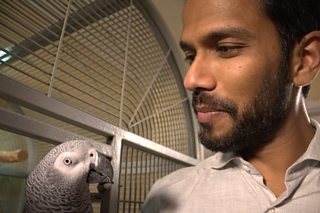Main content
User Guide - Parrots
Parrots have been kept as pets since the time of the pharaohs and remain popular pets today, with an estimated 40,000 pet African Grey Parrots in the UK. They’re among the most intelligent animals kept as pets – one study found they have the reasoning powers of a three-year-old child.

Taking on an African Grey Parrot is a major responsibility, not least because they can live for up to 60 years in captivity and require a lot of care and attention.
- In the wild, African Greys live in large flocks and are very sociable. For their welfare it’s worth getting more than one, or else being committed to spending a lot of time with them.
- Ensure you buy a parrot that is captive-bred and reared by their parents, as hand-reared birds can have behaviour problems and are more prone to stress.
- When it comes to buying a bird cage the rule is – the bigger the better. Furnish the cage with plenty of toys and perches to keep your bird stimulated. Water should be provided so they can wash themselves and the cage should be cleaned weekly. Cages that are coated with lead or zinc can be highly toxic to parrots and are a potential cause of feather loss.
- Ideally you should also provide a large outdoor aviary for better mental and physical stimulation.
- Their sensitive airways are also easily damaged by the fumes released by a range of common household products. Teflon-coated saucepans for cooking, air fresheners, scented candles and certain cleaning products should be avoided. It’s also important not to expose them to tobacco smoke.
- Parrots in their sunny tropical habitat get a lot of UV light, which is essential to give them adequate levels of calcium and vitamin D3. Installing a full-spectrum UV light above its enclosure and keeping it on for 6 to 8 hours a day is essential.
- It’s possible to catch diseases from parrots that can be harmful to human health, so ensure you wash hands and surfaces after handling. Your food and theirs should be kept separate.
- Feed your pet a large array of fruit and vegetables and supplement it with specialist parrot food pellets. Almonds and pistachios are a good source of calcium, but should be fed sparingly as they’re high in calories. Avocado and chocolate are both toxic and should be avoided. Provide them with a calcium and multi-vitamin supplement at least twice a week.
- Seeds are also a poor source of nutrition for all birds, but African Grey Parrots can become so attached to seeds that they will avoid other foods on offer.
- Mixed seed-based parrot foods usually contain seeds which have been condemned for human consumption and often have fungal mould contamination which can cause severe respiratory disease in birds. Monkey nuts and peanuts are also best avoided for the same reason.
Register your parrot with the nearest exotic vet practice and take it for a check-up every six months or so. Consider getting your bird micro-chipped so you can be reunited in case it escapes.
